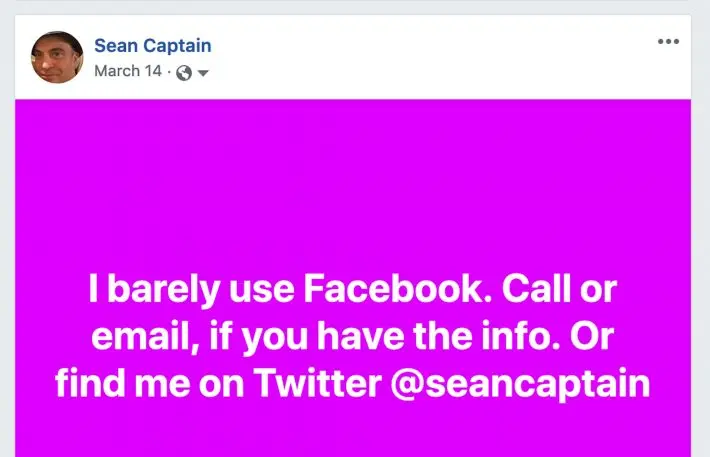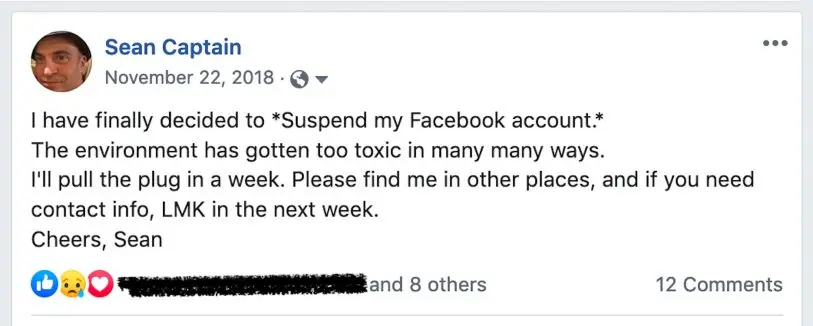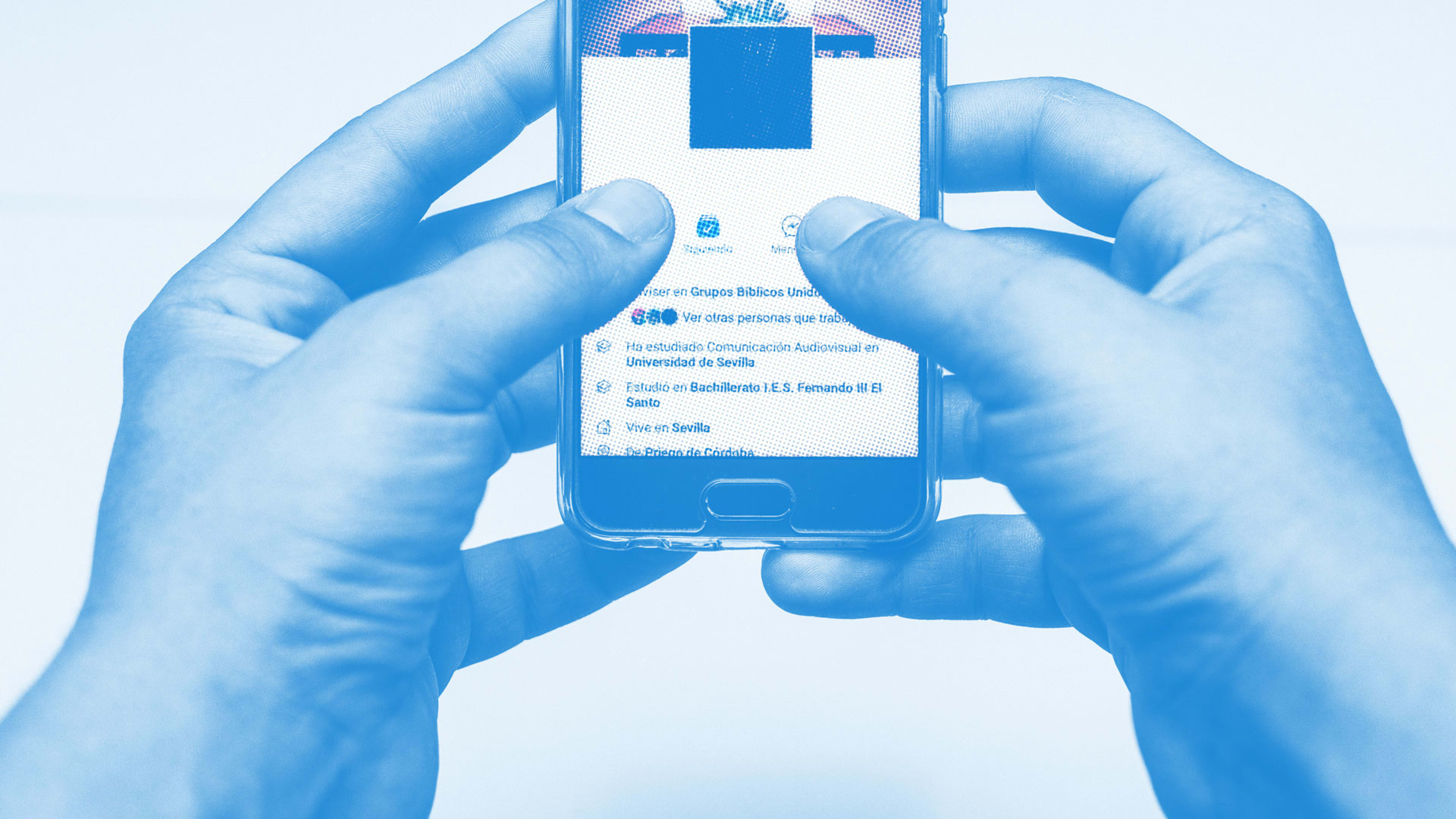I dislike Facebook and am generally much happier when I’m away from it. But I can’t stay away completely. I’m a journalist, and many companies and organizations I cover (as well as my sources) have a big presence on the social network. Also, I really want to see photos and videos of my niece and nephew. And as much as I’d like friends and family to use an independent encrypted messaging app like Signal, the vast majority of them are on Facebook Messenger or WhatsApp (which, it should be said, do offer encryption technology).
If a Facebook curmudgeon like me can’t get entirely off the network, how can I argue that other people should? From dubious user protections to a timeline full of political rants, deathly boring status updates, and creepy targeted ads, Facebook can be a real pain in the ass. But I’ve come to accept it as chronic pain, which can be managed and reduced, if not cured.
Harm reduction
“People keep banging the ‘delete Facebook’ drum. But for a lot of people, if not most people, that’s just not practical advice,” says Gennie Gebhart of the Electronic Frontier Foundation (EFF). “And it’s kind of ridiculous to suggest that you do so.”
Given all the times Facebook has gone back on its word to users about privacy policies, snubbed regulators around the world, and even—according to critics—defied an order from the U.S. Federal Trade Commission, it would be naïve to assume the company will always tell the truth. It now appears to be facing a multibillion-dollar FTC fine over violations.
Longtime critic and watchdog Marc Rotenberg of the Electronic Privacy Information Center (which has sued the FTC over its Facebook oversight) says that the only solution is legislation that compels the service to be transparent about its data-gathering activities. “You want legal rights that allow you to get access to all of the information Facebook gathers about you,” he says. Anything short of that, like dutifully tweaking your privacy settings, is “a waste of time,” he argues.
Rotenberg’s stance is understandable: EPIC maintains a depressingly extensive running list of Facebook privacy glitches, deceptions, and acts of arrogance. (However, that hasn’t prevented Rotenberg from having his own Facebook account, where he mostly posts about EPIC and privacy issues.)
Other experts are less pessimistic. “I definitely don’t agree it’s a waste of time,” says Leigh Honeywell, a security engineer and cofounder of Tall Poppy, a consultancy that helps people protect themselves from online harassment. Facebook isn’t the only person you have to worry about when you’re on Facebook. Honeywell advises people on how to “lock down” social media profiles so it’s harder for sketchy characters to skim personal information or break into accounts.
And there are plenty of things we can do at least to curtail both hackers and Facebook’s own snooping. For starters, give the network as little information as possible (not your phone number or street address, for instance). For a bigger list of the most-effective (if not perfect) privacy and security measures you can take, see my recent article “These 11 Facebook privacy tweaks put you back in control.”
Likewise, we can limit how much information we get from other people. Hiding inane postings from those you otherwise care about (like family members) is a start. Also take an unsentimental look at your “friends” list. Evolutionary psychologist Robin Dunbar says that humans are wired to live in communities of no more than about 150 people. So why do you have 400 friends on the network?
However, you might maintain more “friends” who are really just newsfeeds. An actual real-world friend of mine who’s a psychologist says she follows magazines, journals, and practitioner groups on Facebook to keep up on the latest research.
Facebook has also become the galactic address book, probably the best way to find those “long-lost” folks in your life. But after you’ve found them, you don’t need to see every scrap of information they post. If you want to stay in touch, get their email or phone number and consider unfriending them on Facebook.
I don’t know how to quit you
Every time there’s a major new Facebook scandal—privacy violations, security lapses, election hacking, genocide facilitation—journalists, pundits, and activists issue the call to quit Facebook. Almost no one does. According to the company’s latest earnings report, its member base grew by 8% to 2.38 billion monthly active users between March 2018 and Match 2019.

Trust in Facebook has plummeted, according to the Pew Research Center, and many Americans have fiddled with security settings and cut back use (which is great). But just a few million younger users in the U.S. have left, per an Edison Research survey. And most of them have switched to Instagram, leaving them as ensnared by the company as ever, just on a different platform. (That’s likely because they consider Facebook less cool than it used to be, rather than less trustworthy.)
“If you look at these kinds of events, people get all upset about it and then their behavior doesn’t change very much,” Robert Blattberg, a professor of marketing at Carnegie Mellon University’s Tepper School of Business, told NBC News.

Meanwhile, we’ve seen proclamations of withdrawal, followed by partial retrenchment. In March 2018, for instance, journalist Dan Tynan quit Facebook and wrote about his decision and process for Fast Company. A year later he wrote a follow-up saying that he had not entirely left the network. Instead, he’d created a new “fake account” to connect with a small number of people. He also confessed to being active on Instagram, and missing the ability to find and check on long-lost friends on Facebook.
Lest I throw stones at my glass house, here’s a confession. In November 2018, I announced plans to suspend my Facebook account after comments on one of my posts exploded into a storm of racist accusations between two friends. I’d be dormant in a week, I warned. So anyone who wanted to stay in touch should work out an alternative way to be in contact before the deadline.

Over a year and a half later, I still have an active Facebook account, although I log in way less and have gradually weaned my posting and liking to nearly zero. But I use Instagram a few times a week, and I’ve been spending more time on Twitter. (Not that it’s any better, but Twitter is even more important for my job.)
For me, proclaiming my departure from Facebook was like announcing that I would totally give up sugar—but then losing my will in the middle of the night and munching on cookies. Instead, I’ve realized it’s better to acknowledge that a few sweets now and then won’t hurt me too much and even bring some joy—and consume them by the light of day.
Recognize your brand's excellence by applying to this year's Brands That Matters Awards before the early-rate deadline, May 3.
